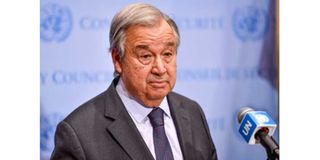Call for women inclusion in climate solutions dominates CSW66

UN Secretary-General Antonio Guterres.
What you need to know:
- UN Women Executive Director Sima Bahous terms session a critical moment for commitment to action as it takes place amidst crises, conflict and the Covid-19 pandemic.
- UN Secretary-General Antonio Guterres underscores the need to chart a path that recognises the critical intersections of gender inequality, climate crises and their impacts.
The ongoing 66th session of the UN Commission on the Status of Women (CSW) has supported calls for the inclusion of women and girls in climate solutions.
Participants have called for commitments to action on climate change and sought assurance from governments that no one will be left behind.
The CSW66 started on Monday and will end on March25. Its theme is ‘Achieving gender equality and the empowerment of all women and girls in the context of climate change, environmental and disaster risk reduction policies and programmes’.
Speaking during the official opening of this year’s CSW in New York, UN Women Executive Director Sima Bahous termed the session a critical moment for commitment to action as it takes place amidst crises, conflicts and the Covid-19 pandemic.
“The interlocking crises we face today continue to compound each other’s impacts as threat multipliers. But women are the solution multipliers,” said Ms Bahous.
Leadership and decision-making
UN Secretary-General Antonio Guterres underscored the importance of charting a path that recognises the critical intersections of gender inequality, climate crises and their impacts, and ensures women’s leadership in decision-making.
“We are still living with the results of millennia of patriarchy that excludes women and prevents their voices from being heard. We cannot realise any of our goals without the contributions of all. And this is why everyone, including men and boys, should be working for women's rights and gender equality,” said Mr Guterres.
The UN boss said it will be difficult to achieve the aspiration of the Paris Agreement if women's full and equal participation and leadership is ignored.
The 2015 Paris Agreement sets out a global framework to avoid dangerous climate change by limiting global warming to below 2°C and pursuing efforts to limit it to 1.5°C. It has a specific provision for the empowerment of women, recognising that they are disproportionately hurt.
Experiences
The leader of the Generation Equality Action Coalition for Feminist Action for Climate Justice, Joanita Babirye, said it is important to have women's voices and experiences at the heart of climate change solutions.
“These negotiations act as a mirror of the world, helping us to see the power imbalances that are driving gender inequalities. Once we see these imbalances, we can build strategies that dismantle them. We need to take collective action because, as we all know, there is no gender justice without climate justice,” said Babirye.
Studies by the UN shows women are more likely than men to bear the burden of climate change, with its figures indicating that 80 per cent of the people displaced by climate change are women.
In developing regions, women and girls may suffer more from global warming than men and boys do. The studies indicate that their roles as primary caregivers and providers of food and fuel make them more vulnerable when flooding and drought occur.
The CSW is the principal global intergovernmental body exclusively dedicated to the promotion of gender equality and the empowerment of women.




